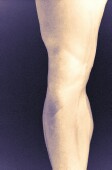Case vignette addresses hierarchy of treatment, starting with nonpharmacologic options
WEDNESDAY, March 11, 2015 (HealthDay News) — For patients with knee osteoarthritis, the evidence should be considered before recommending viscosupplementation, according to a case vignette study published in the March 12 issue of the New England Journal of Medicine.
David J. Hunter, M.B., B.S., Ph.D., from the University of Sydney, presented the case of a 67-year-old woman with right-knee osteoporosis who had a body mass index of 32 kg/m², and had had pain intermittently for nine years. The patient inquired about the possibility of a hyaluronate injection for pain relief.
The author notes that the efficacy of hyaluronate-related agents is uncertain among patients with knee osteoarthritis; some meta-analyses have found it to be indistinguishable from placebo. Comprehensive management of osteoarthritis should include a combination of treatment options directed toward the goals of alleviating pain and improving function. The recommended hierarchy of management includes nonpharmacologic methods (weight loss, exercise, braces, and assistive devices), analgesic medicine (including nonsteroidal anti-inflammatory drugs [NSAIDs]), and then surgery. Local therapies such as topical agents may mitigate some of the concerns associated with systemic therapies. Current evidence suggests that viscosupplementation may be as effective as NSAIDs and result in fewer systemic adverse events. The use of intraarticular hyaluronate is recommended if a patient does not have a satisfactory response to acetaminophen or NSAIDs.
“For the case in question, this patient was counseled to lose weight and undertake a strengthening exercise program and was counseled against the use of intraarticular hyaluronate,” Hunter writes.
The author disclosed financial ties to the pharmaceutical and medical device industries.
Full Text (subscription or payment may be required)
Copyright © 2015 HealthDay. All rights reserved.








